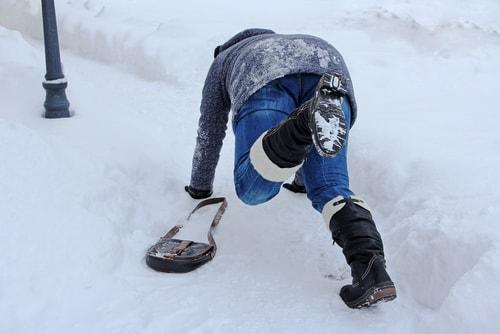Apportioning Responsibility for a Late-Winter Slip-and-Fall
 In the Chicago area, the battle between the end of winter and the start of spring in the months of March and April can wreak havoc on Illinois roads, sidewalks, and points of ingress and egress at local businesses. Rain turns to snow, snow turns to rain, and sometimes precipitation however between its solid and liquid states, coating surfaces with a dangerous layer of icy slush. The city is usually dogged in its efforts to plow snow to the sides of roads and dissolve ice with salt. The same is true of most local business owners, whom, like the city government, literally have a duty to safeguard persons visiting, entering, exiting, or crossing a business’s premises.
In the Chicago area, the battle between the end of winter and the start of spring in the months of March and April can wreak havoc on Illinois roads, sidewalks, and points of ingress and egress at local businesses. Rain turns to snow, snow turns to rain, and sometimes precipitation however between its solid and liquid states, coating surfaces with a dangerous layer of icy slush. The city is usually dogged in its efforts to plow snow to the sides of roads and dissolve ice with salt. The same is true of most local business owners, whom, like the city government, literally have a duty to safeguard persons visiting, entering, exiting, or crossing a business’s premises.
As such, if a retailer, bar, restaurant, or other business fails to protect customers (and even mere visitors or passersby) by diligently keeping ice at bay and posting warning signs about slick surfaces, and a slip-and-fall in which personal injuries are sustained results, the business may be held liable for the injuries and other losses.
Inadequate Surface Maintenance and Signage Is Indicative of Negligence
When a slip-and-fall occurs, the injuries sustained may be severe, including:
- Broken bones;
- Concussions;
- Spinal Injuries;
This is especially the case for elderly persons. A slip-and-fall in which results in a broken hip can be simply devastating, permanently limiting mobility – a central component of personal freedom. While nothing can “unbreak” a bone, premises liability law allows for a business to be held liable for injuries and other losses sustained in a slip-and-fall if the business has been negligent in maintaining the surface in and around its premises or in posting ample warning signs about the presence of slippery conditions. While no business can be expected to stop a rain or snow storm (obviously), it is expected to make all reasonable efforts to safeguard customers, visitors, and passersby from dangers present on its premises.
Negligence Is a Basis for Obtaining Damages in the Form of Financial Compensation
Premises liability law is a subset of negligence law. Negligence, a tort, is the breach of a duty owed that actually and proximately causes damages. The duty owed by businesses its invitees (individuals visiting its premises) is one above and beyond the duty we all owe to another as human beings sharing in society. When this duty has been breached, rely on an experienced Park Ridge personal injury attorney to seek compensation for your medical bills, pain and suffering, lost income due to missed work, and all other losses.
Source:
http://www.ilga.gov/legislation/ilcs/ilcs3.asp?ActID=1865&ChapterID=50
 847-232-7180
847-232-7180






